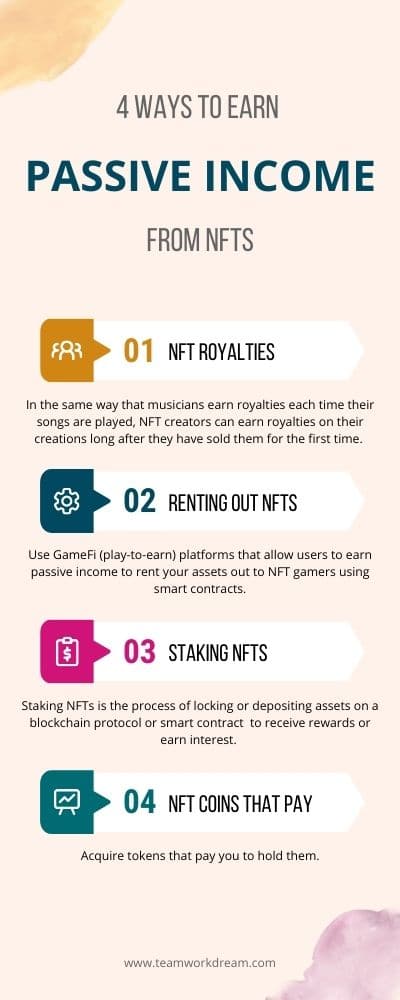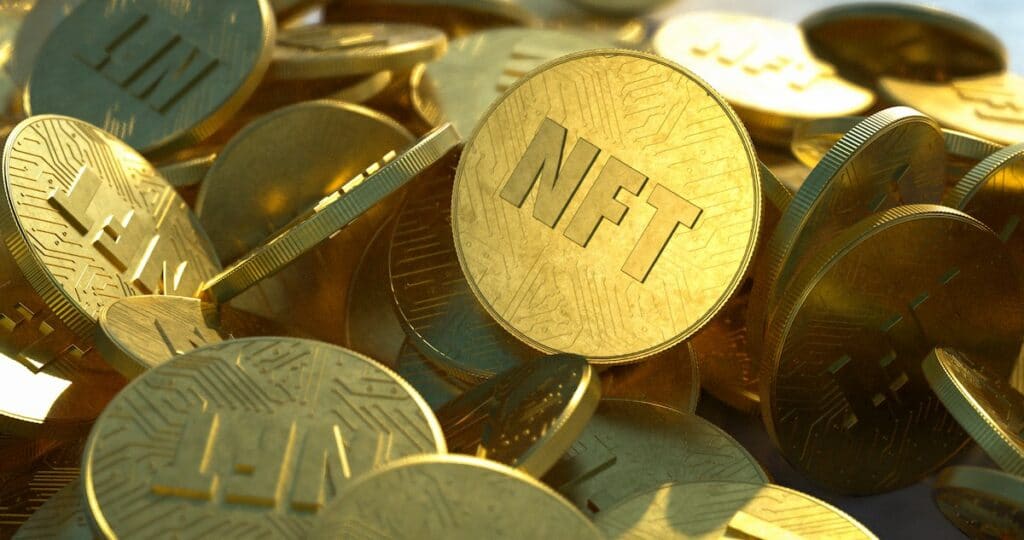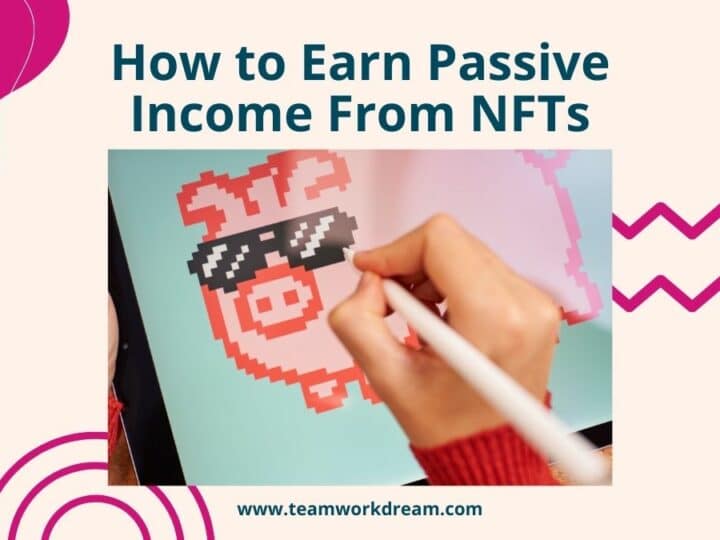Looking for different ways to earn passive income from your NFTs?
Whether you’ve got an impressive collection of non-fungible tokens, or are looking to purchase your very first NFT, using your NFT to generate passive income is a smart move.
Ready to find out how? Let’s go.
Glossary of Terms:
NFT – A Non-Fungible Token
Passive Income – A source of revenue requiring minimal effort
NFT Staking – The act of locking up an NFT on a staking platform to receive rewards
GameFi – A virtual environment where players can participate and earn money

NFTs and Passive Income: Explained
What exactly is an NFT? An NFT – or Non-Fungible Token – is a unique and verifiable item that cannot be replicated.
Think of it as the digital equivalent of an IRL item with a serial number that marks the item as completely legit. NFTs work by providing owners with one-of-a-kind data that proves the person has ownership of the item.
As the hype around NFTs has exploded, the space has only gotten bigger and better – now it’s possible to own digital assets like art and music, as well as real estate in the metaverse.
But exactly how do you make passive income from these NFTs?
Whether you’re interested in creating or collecting NFTs (or both!), it’s also possible to make passive income from these tokens, through a variety of mediums. In the past, it was only really possible to generate income from NFTs by creating and selling them at the right time, though this has changed significantly in recent years.
The main methods that we will talk you through in this guide are utilising NFT royalties if you’re creating NFTs, NFT staking, renting out your NFTs to gamers, and purchasing certain kinds of NFTs that reward you for holding with native tokens (don’t worry, all will be revealed).
Through these mediums it’s possible to generate a significant amount of income, with very little effort required on your behalf.
Allow us to explain the easiest ways to generate passive income from NFTs…
Types of Passive Income from NFTs
Earn Passive Income Through NFT Royalties

In the same way that songwriters and musicians earn royalties each time their songs are played on the radio or streamed, NFT creators can earn royalties on their creations long after they have sold them for the first time.
Not sure how to create an NFT? We’ve written a handy guide that talks you through the process here. Aside from the big bucks that can be made when selling NFTs, you can actually earn money EVERY SINGLE TIME your NFT is sold in the future.
The way it works is by building this rule into the smart contract when your NFT is created, where the action will automatically get executed on the blockchain.
The most common royalties are between 5% and 10%, which can add up to serious money if your NFT continues to appreciate in value.
Renting out NFTs to make passive income
Renting out NFTs is a new yet increasingly-popular method of generating passive income. Currently, there are plenty of GameFi (play-to-earn) platforms that allow users to earn passive income by renting their assets out to NFT gamers using smart contracts.
NFTs have spiked in price and popularity in recent years, and many gamers cannot afford to own their own – this is a way around the issue with benefits for the renter and the rentee.
These NFTs can range from characters, weapons, tools, or skins, each are things that can enhance gameplay. NFT owners are able to set the duration of the rent and the price, and the blockchain will generate a smart contract and match them to a suitable user.
One of the leading NFT renting sites is ReNFT, a platform that acts as an Escrow by holding rented NFTs with a third party. Vera is another platform that allows users to rent NFTs out.
This system allows for NFT rentals without collateral, which means that owners are able to trust that the original asset remains in a smart contract rather than in the hands of the borrower, not able to be replicated or stolen.
Though it’s important to bear in mind that, as this type of passive income generator is in its early stages, many of the platforms are yet to be fully developed.
Staking NFTs to Earn Passive Income

What is NFT staking? In simple terms, staking NFTs refers to the process of locking or depositing assets on a blockchain protocol or smart contract in order to receive rewards or earn interest. This is all possible without having to sell your NFT.
Generally, it’s one of the best ways to earn passive income with a low risk and high reward.
How does this work? Well, the blockchain effectively locks the funds in a huge staking pool, before choosing validators or ‘miners’ at random who are tasked with confirming the blocks of transactions on the blockchain.
By staking your assets and becoming a validator, you’re able to make your idle assets work in exchange for passive income, with the freedom to remove them from the pool at any time (dependant on the platform’s rules).
Whilst staking is snowballing in popularity as of late, the vast majority of NFT staking comes from play-to-earn games. Some examples of these games are:
There’s no doubt that staking is one of the top passive income generators for NFTs, mainly because you’re able to still retain ownership of your NFT whilst making money.
There are many benefits of getting involved with NFT staking, including the fact that many NFT staking platforms will reward users with unique NFTs – many of which have exclusive owner benefits. As well as this, it increases the liquidity (or availability) of the rare assets which, in turn, encourages more investors.
Though it’s important to remember that, as with any financial investment, there are downsides. The main one being that while your NFT is staked you are unable to sell it – this is a gamble as the asset could reduce in value significantly.
Buying NFT Coins That Pay You to Hold

When purchasing passive income NFTs, one of the more advanced ways is by acquiring NFTs that reward holders with tokens.
If you’re wondering what an NFT coin is, allow us to explain. It’s basically any cryptocurrency that’s involved with the NFT ecosystems – or games.
There are NFTs that actively reward you with native tokens for holding them – one of the first to do this was CyberKongz.
Holders of the original batch of NFTs get 10 $BANANA tokens every day for 10 years and, while the creators stress that this coin has no economic value, it’s possible to trade it on some platforms and use it within its own ecosystem.
While getting hold of a genesis (original) NFT is very expensive now – mainly because it makes it far too simple to generate passive income – there are more affordable NFTs that work on a similar model by rewarding holders with coins.
For example, Mutant Cats works in the same way as CyberKongz, with 10 $FISH tokens given out to holders every day, while Bears Deluxe ($HONEY) are planning to introduce games on their platform where token holders can collect currency for free.
Like regular NFTs, NFT coins can also be traded and invested in a more traditional sense, which can lead to passive income generation. Generally, you use them in a similar way as Crypto, investing in those that you predict will rise in value – coins will often appreciate in relation to the game’s popularity.
A popular example of this is the Axie Infinity NFT game, which uses their native token AXS to facilitate staking and voting in-game, enhancing the play-to-earn economy.
One way in which NFT coins do differ from NFTs is in their fungibility – for example, an NFT is unique and cannot be replicated, whereas NFT coins can be traded for another NFT coin of the same value.
Aside from AXS, some of the most popular NFT coins that might pay you to hold right now are:
- ApeCoin
- MANA
- SAND
- GALA
- ENJ
NFTs That Pay You To Hold
If you’re looking for the easiest way to generate passive income, purchasing an NFT that actively pays you to hold (by rewarding with native tokens) is one of the simplest ways.
Current NFTs that actively pay you to hold include:
- CyberKongz: Deposits 10 $BANANA tokens every day for 10 years to those holding a genesis NFT.
- CoolCats: Those with a CoolCat NFT are able to claim $MILK tokens, which accumulate over time. The platform also allows players to earn $MILK by sending their NFTs on quests.
- MutantCats: Rewards those with a MutantCat NFT with 10 $FISH tokens per day.
- Loopy Donuts: Rewards those with a Loopy Donut NFT with 10 CHILL tokens per day.
Native (or platform-specific) NFT coins can often be traded just like any other type of cryptocurrency – though it’s worth checking what’s written into the smart contract before you dive in head-first.
When it comes to the top NFTs that make passive income in a more traditional buying-trading sense, it makes sense to purchase those that are already gaining traction within the space.
One of the best ways to do this is by using Opensea to check out the most popular NFTs at the moment. Whilst these can be more expensive to purchase than some of the lesser-known NFTs, it’s often a safer bet in terms of investing and generating passive income.
The Apes are often at the very top of Opensea’s rankings, with the likes of Mutant Ape Yacht Club and Bored Ape Yacht Club topping the lot, though Art Blocks and Cryptopunks are other safe bets.
Often when looking to purchase NFTs with passive income potential, it’s a little bit of a gamble – though if you invest in NFTs that are already popular, you reduce the risk of losing any money.
NFTs That Give You Passive Income: Final Thoughts

So, now we’ve looked at exactly how you can make passive income from NFTs, which method is best? Well since the nature of cryptocurrency and NFTs can be volatile, there’s not really a straight answer.
If you’re looking to create your own NFT, the simplest way to earn passive income is by writing royalties into the smart contract – this will save you lots of time and could make you lots of money for years to come.
However, if you have no interest in creating your own NFT and would prefer to buy and trade them instead, investing in popular NFT coins can be a safer way to make passive income – though, it might not be very much to begin with.
If you’re investing in a coin, remember that it should be a long-term thing – making quick bucks is very rare (and often relies solely on luck).
Staking NFTs is also a simpler method for beginners looking to get into the NFT space and begin to make passive income. Although, it’s important to remember that you cannot sell an NFT while it is staked, and by the time you come to sell your asset its value could have significantly dropped, causing you to lose money in the process.
Remember that when it comes to purchasing and trading NFTs, never put in more money than you can afford to lose.

